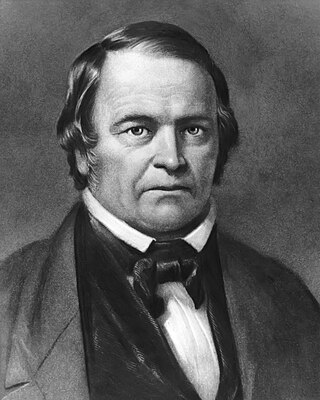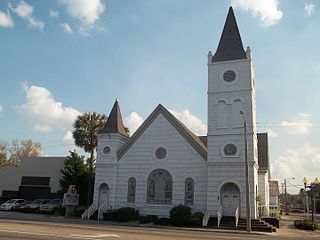
Adventism is a branch of Protestant Christianity that believes in the imminent Second Coming of Jesus Christ. It originated in the 1830s in the United States during the Second Great Awakening when Baptist preacher William Miller first publicly shared his belief that the Second Coming would occur at some point between 1843 and 1844. His followers became known as Millerites. After Miller's prophecies failed, the Millerite movement split up and was continued by a number of groups that held different doctrines from one another. These groups, stemming from a common Millerite ancestor, became known collectively as the Adventist movement.

The Christian Church (Disciples of Christ) is a mainline Protestant Christian denomination in the United States and Canada. The denomination started with the Restoration Movement during the Second Great Awakening, first existing during the 19th century as a loose association of churches working towards Christian unity, then slowly forming quasi-denominational structures through missionary societies, regional associations, and an international convention. In 1968, the Disciples of Christ officially adopted a denominational structure at which time a group of churches left to remain nondenominational.

The Second Great Awakening was a Protestant religious revival during the early 19th century in the United States. The Second Great Awakening, which spread religion through revivals and emotional preaching, sparked a number of reform movements. Revivals were a key part of the movement and attracted hundreds of converts to new Protestant denominations. The Methodist Church used circuit riders to reach people in frontier locations.

The Southern Baptist Convention (SBC) or Great Commission Baptists (GCB) is a Christian denomination based in the United States. It is the world's largest Baptist denomination, and the largest Protestant and second-largest Christian denomination in the United States. Organized in 1845, the denomination advocated for slavery in the United States. During the 19th and most of the 20th century, it played a central role in Southern racial attitudes, supporting racial segregation and the Lost Cause of the Confederacy while opposing interracial marriage. In 1995, the organization apologized for its history. Since the 1940s, it has spread across the states, having member churches across the country and 41 affiliated state conventions.

The Church of God, with headquarters in Cleveland, Tennessee, United States, is a Holiness-Pentecostal Christian denomination. The Church of God's publishing house is Pathway Press.

The Holiness movement is a Christian movement that emerged chiefly within 19th-century Methodism, and to a lesser extent other traditions such as Quakerism, Anabaptism, and Restorationism. The movement is historically distinguished by its emphasis on the doctrine of a second work of grace, generally called entire sanctification or Christian perfection and by the belief that the Christian life should be free of sin. For the Holiness movement, "the term 'perfection' signifies completeness of Christian character; its freedom from all sin, and possession of all the graces of the Spirit, complete in kind." A number of evangelical Christian denominations, parachurch organizations, and movements emphasize those beliefs as central doctrine.
The Central Baptist Association is an association of churches located from South Carolina to Indiana, with most of the churches being in eastern Tennessee and southwestern Virginia. In 1956, some churches of the Eastern District Primitive Baptist Association separated and formed the Central Baptist Association. The churches entering this new organization desired to be more progressive and to provide a home for homeless and destitute children. They adopted the name Central Baptist "as an indication of our acceptance of the Holy Scriptures in their entirety, varying neither to the right or left". In 1996 there were almost 4000 members in 34 churches located in five states. Currently they have headquarters in Jasper, Virginia, including a tabernacle, a children's home and a youth Bible camp.
The Old Regular Baptist denomination is one of the oldest in Appalachia with roots in both the Regular and Separate Baptists of the American Colonies and the Particular Baptist of Great Britain. This group has seen a marked decline in its membership during the last two decades. The Old Regular Baptist Faith and order with her many branches and factions still remains the dominant Faith in some rural Central Appalachian Counties along or near the Kentucky Virginia border.
Nondenominational Christianity consists of churches which typically distance themselves from the confessionalism or creedalism of other Christian communities by not formally aligning with a specific Christian denomination. Many non-denominational churches have a congregationalist polity, which is self-governing without a higher church authority.

The Separate Baptists are a group of Baptists originating in the 18th-century United States, primarily in the South, that grew out of the Great Awakening.
A singing school is a school in which students are taught to sightread vocal music. Singing schools are a long-standing cultural institution in the Southern United States. While some singing schools are offered for credit, most are informal programs.

The camp meeting is a form of Protestant Christian religious service originating in England and Scotland as an evangelical event in association with the communion season. It was held for worship, preaching and communion on the American frontier during the Second Great Awakening of the early 19th century. Revivals and camp meetings continued to be held by various denominations, and in some areas of the mid-Atlantic, led to the development of seasonal cottages for meetings.

The black church is the faith and body of Christian congregations and denominations in the United States that minister predominantly to African Americans, as well as their collective traditions and members. The term "black church" can also refer to individual congregations.
William Augustus Jones Jr. was an African-American Minister and Civil Rights leader.

The Evangelical Christian Church(Christian Disciples) as an evangelical Protestant Canadian church body. The Evangelical Christian Church's national office in Canada is in Waterloo, Ontario.

Religion of black Americans refers to the religious and spiritual practices of African Americans. Historians generally agree that the religious life of black Americans "forms the foundation of their community life". Before 1775 there was scattered evidence of organized religion among black people in the Thirteen Colonies. The Methodist and Baptist churches became much more active in the 1780s. Their growth was quite rapid for the next 150 years, until their membership included the majority of black Americans.

The Triennial Convention was the first national Baptist denomination in the United States. Officially named the General Missionary Convention of the Baptist Denomination in the United States of America for Foreign Missions, it was formed in 1814 to advance missionary work and headquartered in Philadelphia, Pennsylvania. In a dispute over slavery and missions policy, Baptist churches in the South separated from the Triennial Convention and established the Southern Baptist Convention in 1845. This split left the Triennial Convention largely Northern in membership. In 1907, the Triennial Convention was reorganized into the Northern Baptist Convention, which was renamed American Baptist Churches USA in 1972.
In Christianity, a family integrated church is one in which parents and children ordinarily attend church services together; during the service of worship, children and youth stay all through church services and do not attend children's and youth ministries during this time. Other terms used are family discipleship churches, family-centered ministry and inclusive-congregational ministry.











